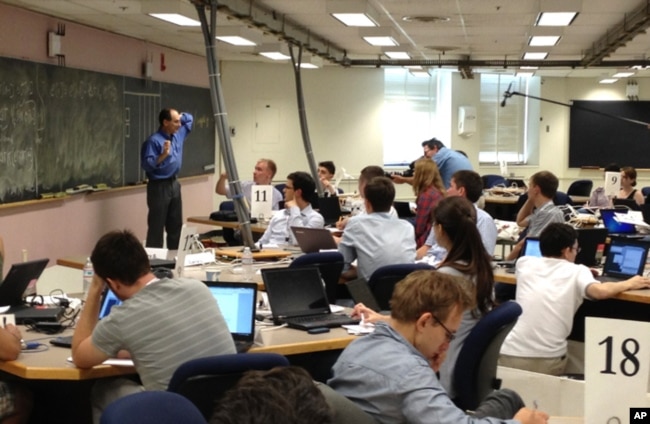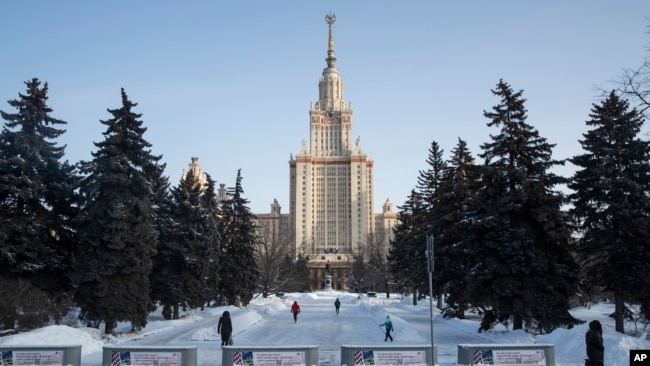ウクライナ国民と比較対象には到底なりません。
しかしながらが、自国を出なければならない状況は、同様にあまりに悲劇です。
元であれ、現在であれ、共産主義をかかげた国は、根底から覆らないことを学びました。
経済だけ資本主義を取り入れたことが、民主主義国とのさらなる切り離せない深い対立構造を浮かび上がられています。
この悲劇は、いつまで続くのでしょうか、永遠か・・・・・
VOAで英語を学びましょう!!
ロシアのウクライナ戦争がもたらす学術交流の損失(和訳)
How Russia’s War in Ukraine Will Hurt Academic Exchange
June 05,2022
2月下旬にロシアがウクライナに侵攻した際、欧米の多くの政府はプーチン政権との貿易などの交流を制限する行動に出ました。
しかし、対ロ規制はモノのやり取りだけにとどまりません。学術交流にも影響が出ました。
ロシアに留学していた欧米の学生たちは帰国し、ロシアの大学を支援していた米国の大学は、財政的・学術的支援を取りやめました。ロシアの科学者と共同研究していた欧米の科学者は、研究を中断しました。
アリク・ブラコヴスキー氏は、マサチューセッツ州タフツ大学の国際法・外交の専門家で、同大学フレッチャー法外交大学院のロシア・ユーラシアプログラムのアシスタントディレクターでもあります。
The Conversationに寄稿した解説で、ブラコヴスキー氏は、ロシアの大学との関係が切れると学術交流が損なわれると述べています。さらに、ロシア人と欧米の学者の意見交換がなければ、ウラジーミル・プーチン大統領は民主的な考えを自国に持ち込まないようにできるかもしれないとも述べています。
欧米とロシアの大学には、どのようなつながりがあったのでしょうか?
ブラコヴスキー氏は、1991年の冷戦終結以降、ロシアと欧米の大学は、学術交流プログラムや授業開発、研究プロジェクトに取り組んできたと言います。
その結果、ロシアの大学は強くなりました。
また、ロシアの大学は旧ソ連邦の国々に校舎を建て、学生たちに海外留学の機会を提供しました。近年、ロシアの大学では英語での授業が増えました。そのため、他国からの留学生を受け入れることができるようになったのです。また、ロシアの大学は、欧米の大学と共同で学位プログラムを作りました。例えば、モスクワの社会経済科学大学院が、イギリスのマンチェスター大学と共同で提供する修士号があります。
この関係から何が生まれたのでしょうか?
欧米とロシアの学生は、互いの文化、言語、社会について学びました。科学者たちは、宇宙開発、物理学、気候変動、北極圏の生物学などに関するプロジェクトで協力し合いました。
しかし、しばらくすると、ロシアの指導者たちは、若者を欧米流に教育することを心配するようになりました。西洋の考え方が若者に影響を与えるかもしれないと考えたのです。そのような若者たちが抗議し、より開かれた政府や開かれた選挙を求めるようになることを懸念したのです。
プーチン政権は、ウクライナ侵攻以前から、ロシアで活動できる組織の種類を制限し始めました。例えば、2021年には、サンクトペテルブルク州立大学のアメリカ人教授が、ニューヨーク州のバード大学と関係があるという理由で国外退去処分を受けました。バードは”好ましくない組織”とされました。
同年、ロシアは教育法を改正し、海外の学術提携にはすべて政府の承認が必要となりました。この法律は、"プロパガンダ "や "教育過程における外国の否定的な影響 "に関連するものでした。
ブラコヴスキー氏は、タフツ大学時代、モスクワ、ウラジオストク、サンクトペテルブルグの大学や研究機関との教育・研究交流を監督してきたと言います。この交流により、学生は国際政策についてより深い理解を得ることができました。
しかし、この3月以降、彼の大学の指導者たちは、この活動を”道徳的に許されない”と考えています。
欧米の大学とロシアの大学の関係は、戦争によって今後問題になるのでしょうか?
ブラコヴスキー氏は言います:"イエス "であると。米国では多くの学術指導者が早まった動きをしないよう注意していましたが、ロシアへの留学はもはや許されず、米国のほとんどの大学がロシアでのプログラム支援を終了しました。多くの大学がロシアへの財政的な投資も打ち切りました。
例えば、マサチューセッツ工科大学は、ロシアのスコルコボ科学技術研究所と数百万ドルかけて行っていた提携を解消しました。この提携は2010年から行われていました。
ロシアとの関係断絶に賛成、反対する理由はなんでしょう?
イギリスはまた、ロシアと関係のあるすべての研究プロジェクトに対する資金援助を打ち切ると言いました。
クリス・フィルプ氏は、英国の技術・デジタル経済担当大臣です。彼は、"良心的に考えて、ロシアの大学と共同研究できる人はいない "と述べます。
ロシアとの関係を絶つことを支持するフィルプや他の人々は、それがプーチンとその政府に対抗する方法であると言います。また、学術的なつながりを断つことで、ロシアのスパイ行為から自国を守り、プーチンのプロパガンダを広める力を弱め、ロシアの技術を盗む力を弱めることができると彼らは言います。
ロシアに対抗する姿勢に反対する人たちは、学生や学者が傷ついていると話します。また、ロシアを切り離すという計画は、将来の国際交流のあり方にとって悪い手本になると彼らは言います。
彼らは、科学研究などで協力することは、民主主義を強化し、間違った考えを広めることを防ぐと言います。科学研究などで協力することは、政治的な問題解決にも協力できるという考えを裏付けるものだと彼らは言っています。
ハーバード大学のローレンス・バコウ学長は、ロンドンのインペリアル・カレッジでの講演で、政治的に難しい時代でも学術関係を維持することの重要性を説きました。
しかし、ブラコヴスキー氏は、ロシア・ユーラシア研究センターのハーバード大学のデイヴィスセンターが、ロシアのウクライナ侵攻を非難するメッセージを発表したことを指摘しています。デイヴィスセンターは、戦争への支持を表明する文書に指導者が署名したロシアの大学とは、もう協力しない、と言っています。
ロシアの高等教育はどうなるのでしょうか?
ブラコヴスキー氏は、コネクションの断絶はロシアの若い研究者を苦しめると指摘しています。また、学生や教師に西側からの援助は望めないと思わせることで、プーチン政権を助けることにもなるかもしれません。
ロシアの研究者は、世界の他の地域の同僚とのつながりの欠如を感じていると言います。ロシアは3月、自国の科学者や教育者が国際会議に参加することを許可しないと発言しています。
ロシアの学者たちは、ウクライナ侵攻に反対する発言を安全に行えるのでしょうか?
ブラコヴスキー氏は”ノー”と言います、そして虚偽の情報を流した場合、最高で15年の禁固刑に処するというロシアの最近の法律を指摘しています。
ロシアの教育者たちは、戦争を批判すると職を失い、刑務所に入る危険性があります。戦争が始まると、多くの教師、学生、作家が自ら国を出て行きました。
How Russia’s War in Ukraine Will Hurt Academic Exchange
When Russia invaded Ukraine in late February, many Western governments acted to restrict trade and other exchange with Vladimir Putin’s government.
But the restrictions with Russia have not only affected the exchange of goods. The restrictions have also affected academic exchange.
Western students studying in Russia came home. Universities in the United States that offered support to Russian universities withdrew their financial and academic aid. Western scientists working with Russian scientists suspended their research.
Arik Burakovsky is an expert on international law and diplomacy at Tufts University in Massachusetts. He is also the assistant director of the Russia and Eurasia program at the university’s Fletcher School of Law and Diplomacy.
In an explainer written for The Conversation, Burakovsky said that the cutting of ties with Russian universities will harm academic exchange. He added that, without the exchange of ideas between Russians and Western scholars, President Vladimir Putin may be able to keep democratic ideas from coming into his country.
What kind of connections existed between Western and Russian universities?
Since the end of the Cold War in 1991, Burakovsky said, Russian and Western universities worked on academic exchange programs, lesson development and research projects.
As a result, Russia’s universities have become stronger.
Russian universities also built school buildings in former Soviet countries and offered their students chances to study abroad. In recent years, Russian universities taught more classes in English. This helped welcome students from other countries. Russian universities also created degree programs with Western universities. For example, there was a master’s degree offered by the Moscow School for the Social and Economic Sciences together with the University of Manchester in Great Britain.
What have the relationships produced?
Western and Russian students learned about each other’s cultures, languages and societies. Scientists worked together on projects related to space exploration, physics, climate change, Arctic biology and more.
However, after a while, Russian leaders started to worry about educating young people in the Western way. They thought the Western ideas might influence young people. They were concerned those young people would then protest and ask for a more open government and open elections.
Even before the invasion of Ukraine, Putin’s government started restricting the kind of organizations that could work in Russia. For example, in 2021, an American professor at St. Petersburg State University was deported because of his connection with Bard College in New York state. Bard was considered an “undesirable” organization.
That same year, Russia changed an education law and required government approval for all foreign academic partnerships. The law related to “propaganda” and “negative foreign influence in the educational process.”
Burakovsky said in his time at Tufts, he has overseen teaching and research exchanges with universities and research organizations in Moscow, Vladivostok and St. Petersburg. The exchanges permitted students to gain a better understanding of international policy.
But since March, that work has been considered “morally unacceptable” by leaders at his university.
Are future relationships between Western universities and Russian universities in trouble because of the war?
Burakovsky says: “yes.” While many academic leaders in the U.S. cautioned against moving too quickly, students are no longer permitted to study in Russia and most U.S. universities ended support of programs in Russia. A number of universities ended their financial investments in Russia as well.
For example, the Massachusetts Institute of Technology ended a partnership that had cost millions of dollars with the Skolkovo Institute of Science and Technology in Russia. The partnership had been in place since 2010.
What are the reasons both for and against breaking ties with Russia?
Britain also said it would remove funding for all research projects with links to Russia.
Chris Philp is Britain’s minister for technology and the digital economy. He said he does not see “how anyone in good conscience can collaborate with Russian universities.”
Philp and others who support ending attachments with Russia say it is a way to stand against Putin and his government. They also say breaking academic connections protects their countries from Russian spying, hurts Putin’s ability to spread propaganda and reduces Russia’s ability to steal technology.
Opponents of the stand against Russia say students and scholars are getting hurt. They add that the plan to detach from Russia sets a bad example for the future of international exchange.
They say that cooperating on work such as scientific research strengthens democracy and fights the spread of false ideas. Nations working together on research, they say, supports the idea that countries can work together to solve political problems, too.
In a speech at Imperial College in London, Harvard University president Lawrence Bacow spoke of the importance of keeping academic relations in place even in difficult political times.
However, Burakovsky notes that Harvard’s Davis Center for Russian and Eurasian Studies published a message condemning Russia’s invasion of Ukraine. The Davis Center said it would no longer work with Russian universities whose leaders signed a document offering their support for the war.
How will the broken connections affect higher education in Russia?
Burakovsky suggests the broken connections will hurt young Russian scholars. The moves also may help Putin’s government by making the students and teachers feel like there is no hope of help from the West.
Russian researchers say they feel the lack of connection with colleagues in other parts of the world. Russia said in March that it would not permit its scientists and educators to take part in international meetings.
Can Russian scholars safely speak against the invasion of Ukraine?
In short, Burakovsky says “no,” and points to recent laws in Russia that punish the spread of false information with up to 15 years in prison.
Educators in Russia risk losing their jobs and going to prison if they criticize the war. Many teachers, students and writers left the country on their own when the war started.
Words in This Story
academic – adj. relating to schools and education
scholar– n. a person who has studied a subject for a long time and knows a lot about it
lesson –n. a single class or part of a course of instruction
negative- adj. harmful or bad, not wanted
conscience- n. the part of the mind that makes you aware of your actions relating to right and wrong
collaborate- v. to work together on a project
colleague– n. a person who works with you

